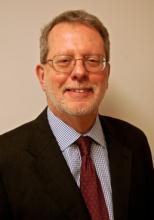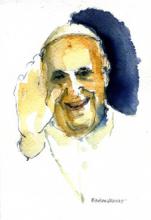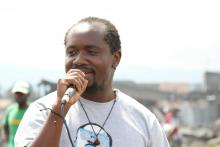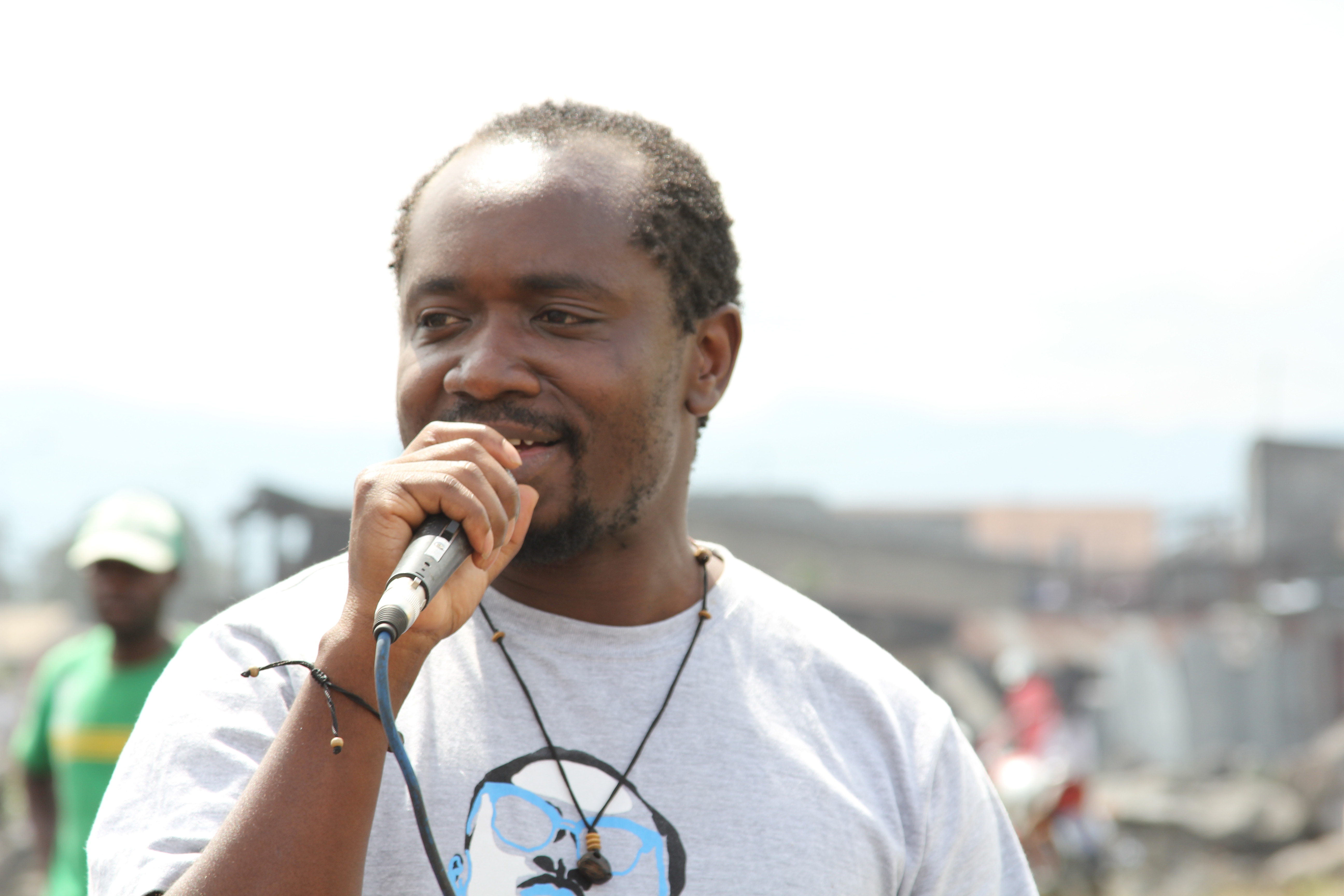change

IN TERMS, America has tried to heal itself. The Civil War took place in the 1860s. The civil rights movement took place in the 1960s. From America’s two biggest domestic conflicts emerge three main elements: the first, a group of people, primarily white, the majority and ruling group in society. Let’s call this group the “Land of the Free”; the second, also a group of people, but a minority, primarily black, originally from Africa, the “Other America”; and the third element of our simplified history is the slavery and poverty that divides the first group from the second and which we will call the “Wall.” ...
There are several questions I must ask myself if I am to be a Christian in America today. One that gives me a great sense of urgency is this: “If change only comes after confrontation and violence, what type of confrontation is needed to make the country livable for all people?”

I'VE NEVER FELT as powerful and proud of my community as I was while walking down the middle of Franklin Avenue in Minneapolis on a cold evening in November with hundreds of other Native activists and allies. We were marching from the heart of the Minneapolis American Indian community to the Hubert H. Humphrey Metrodome to speak out against the Washington Redsk*ns mascot.
Hundreds of American Indians and allies rallied outside the Metrodome to demand that Dan Snyder, owner of the Washington professional football team, change the team’s name and mascot in spite of Snyder’s dissent. The owner’s unwavering commitment to keeping the Redsk*ns name became evident when earlier this year he stated, “We’ll never change the name. It’s simple. NEVER. You can use caps.”
Standing among supporters and friends, I looked on as the community joined together in drumming, dancing, and singing, with American Indian Movement co-founder Clyde Bellecourt serving as the rally’s emcee. Several local elected leaders addressed the crowd, including U.S. Rep. Betty McCollum, co-chair of the Congressional Native American Caucus, and the mayor-elect of Minneapolis, Betsy Hodges, days after winning her election for mayor. The two joined an avalanche of elected leaders calling on Snyder and NFL Commissioner Roger Goodell to change the team’s name.
More than 20 years prior, another protest had been held at the Metrodome for Super Bowl XXVI, a game between the Washington Redsk*ns and the Buffalo Bills. That protest included Clyde Bellecourt’s brother, Vernon, leading the charge with Sen. Paul Wellstone, a friend and champion of the American Indian community. Two decades later, the conversation has changed and momentum is on our side. Even President Barack Obama joined the cause in saying, “I’ve got to say, if I were the owner of the team and I knew that there was a name of my team—even if it had a storied history—that was offending a sizeable group of people, I’d think about changing it.”

My first career: print journalism. Current status of that field: on life support.
My second career: pastoring neighborhood churches. Current status of that field: on life support.
My third career: writing and publishing books. Current status of that field: on life support.
My fourth career: implementing client-server data management systems. Current status of that field: on life support.
Do you see a trend here? I did. So now I try to stay nimble and to keep moving. My publishing business is entirely electronic. I have cycled through three websites and three subscription systems in 10 months. I do more of my church consulting online.

Christian culture, along with the spiritual leaders, churches, institutions, communities, and other entities it consists of, are supposed to make our faith stronger. But in many cases the opposite happens, and it actually causes our faith to die. In religious environments often surrounded by cynicism, hypocrisy, hurtfulness, and disappointment, it’s easy to give up on Christianity. Here’s how to prevent spiritual burnout:
1) Avoid Legalism
Historically, Christianity has always struggled with legalism, where churches often forced beliefs and practices on people with domineering power. Legalistic groups thrive on strict rules, ruthlessness, enforced doctrines, and authoritarian judgment.
Various agendas — that are valued more than the loving gospel of Christ — are promoted and pushed onto people. And it wasn’t that long ago (in fact, it still exists) that American believers were expected to be anti-gay, conservative, pro-choice, anti-evolution fundamentalists.
If fear, condemnation, and shame are used as spiritual weapons to gain power, influence, and control — run!

I got fitted for a custom-tailored suit this week.
Not because I suddenly found a pot of money. I didn’t, and I didn’t need to. The cost for this Hong Kong tailor is comparable to what I have been paying for off-the-rack suits.
My problem is middle age. My shifting body type makes off-the-rack suits too wide in the shoulders and too long. It’s proof that life keeps on changing, and that the way forward must include getting unstuck from old ideas.

Pope Francis’ comments last week on everything from gays to abortion (less talk, more mercy), the hierarchy (be pastors, not bureaucrats), and religious faith (doubt is part of belief) continue to reverberate through the church and the media.
Here are five broader insights that this wide-ranging interview revealed about Francis — and why they will be keys to reading his pontificate, and perhaps the future of Catholicism.

Microsoft CEO Steve Ballmer’s surprise decision to retire does more than throw the technology industry into a frenzy of speculation. It raises the problem of succession.
From major corporations to startups led by visionary leaders, from universities to churches, the departure of the top leader can stop momentum and usher in months, perhaps years, of uncertainty.
Even though dealing with succession is a primary task for a board of directors — some say it’s their preeminent task — relatively few boards take the assignment seriously. They focus instead on the easier work of jousting with the top leader and shilling for institutional investors.
What should be an orderly process of preparing for leadership transition instead becomes a lurching from one standalone regime to the next.
Many board members want the rush of being co-managers of the institution. This is especially true in churches, where boards enjoy making day-to-day decisions about operations. Since a strong central leader would get in their way, many church councils discourage strong clergy and reward compliant permission seekers.
JEREMY SCAHILL SPENT years working out his notions of social justice in homeless shelters and conflict zones and among peace activists. In 2007, Scahill’s award-winning investigative reporting made waves when he published Blackwater: The Rise of the World's Most Powerful Mercenary Army, a comprehensive exposé on the secret role of private military contractors in the United States’ “war on terror,” which prompted several congressional inquiries. Scahill’s newest book, Dirty Wars: The World is a Battlefield, digs into the obscure underbelly of U.S. covert wars.
“In one of my trips to Yemen, I traveled in the south of the country where most of the U.S. drone strikes in Yemen have happened,” Scahill said during a recent visit to Sojourners’ Washington, D.C. office. “I was interviewing a number of tribal leaders. This guy from Shabwa province said to me, ‘[Americans] consider al Qaeda [to be] terrorism. We consider your drones [to be] terrorism.’ I heard that over and over in a variety of countries. ... Many people, in Yemen or in Somalia, would not be predisposed to think of al Qaeda as anything positive. Al Qaeda is a reviled organization in Yemen. ... But there are tribal leaders who are saying, ‘You know, you pushed us into a corner where our people are now sympathetic with al Qaeda.’ After years of traveling in these countries, I really believe that we’re creating more enemies than we’re killing.”
In some respects, drones are simply a new tool of old empire. Scahill’s book title, Dirty Wars (and film of the same name), is partly “a macabre tip-of-the-hat to the dirty wars in Central America, fueled by the United States ... targeting people who are insurgents and claiming they were communists. The new version of this is targeting people who are fighting us and claiming they’re al Qaeda.”

When denominations, churches, faith-based organizations, theologians, pastors, and Christian celebrities change their beliefs on homosexuality, abortion, immigration, and other political and social hot-button issues, they often face a vitriolic pushback from many Evangelicals. Obviously, many see their final stance — such as supporting marriage equality — as a sin, but more surprisingly, many of the vicious reactions attack the very idea of changing one’s beliefs — as if change itself is bad.
American Christianity has created a culture of theological permanence, where individuals are expected to learn a set of beliefs and latch onto them for the rest of their lives. Many of our first theological beliefs were probably taught to us in Sunday school, which was part of a church, which was represented by a denomination, which had its own parochial schools and Bible colleges.
Theoretically, Christians can go from preschool to seminary hearing the exact same religious doctrines. Theologies are often considered too “valuable,” “right,” and “holy” to change or question. Therefore, pastors debate instead of dialogue, professors preach instead of listen, schools propagate instead of discuss, and faith-based communities ultimately reject any form of honest questioning and doubt.
Indoctrination is preferred over critical thinking, certainty is favored over doubt, and we expect our leaders to offer black-and-white answers. A change of theology is viewed as weakness, poor exegesis, and a sign of insecurity. “If they change their views now, how can I believe anything they say in the future?” Christians often perceive change as a break in trust and a loss of identity.

Church is being reinvented. So are technology and education. And all for the same reasons.
Facebook just started moving Google’s cheese with its launch of Home. An army of upstarts in Silicon Valley is challenging the hegemony of Microsoft. Nothing is staying the same; disruption is the path to prosperity.
The reason: the marketplace is highly dynamic. New needs emerge. New products stimulate new needs. New entrants want to make a difference right away. Problems and opportunities multiply faster than bureaucratic pillars can respond.
ON A MILD morning in July 1997, a group of women gathered under the spreading arms of a great neem tree in the village of Malicounda Bambara in Senegal, West Africa. While children played nearby and others rested on their mothers' laps, a woman named Maimouna Traore spoke to the group.
Like most women in Malicounda Bambara, Traore had never gone to school as a child. Opportunities for education in villages like hers were scarce, especially for girls. But one year earlier, a program called Tostan (the word means "breakthrough" in the local Wolof language) had come to her village. The women enrolled in the Tostan program met three times a week, engaging in lessons on literacy and math, health and hygiene, problem-solving—and, most important of all, human rights.
Addressing her words to Molly Melching, Tostan's founder and the one American present among them, Traore said that, before the program, women in her community did not understand human rights. They did not know that, like men, they have the right to health and well-being, to speak their minds and offer their opinions. With their new understanding of these concepts came courage. They invited Melching because, after much thought and discussion, they had made an important collective decision: to end the practice of female genital cutting (FGC) in their community.
Melching was speechless. Rarely discussed openly, FGC, the complete or partial removal of female genitalia for non-medical reasons, is a long-held and deeply entrenched custom in many villages of Senegal, as well as in 27 other African nations. Known locally as "the women's tradition," it has been regarded as among the most critical moments in a girl's life, preparing her for marriage and making her a respected member of her community. To not cut one's daughter was unthinkable—setting her up for a lifetime of rejection and social isolation.

Dear Sojourners friends,
I have some news to share with you that is difficult (for me at least) but wanted you to hear it from the horse’s (or mama bear’s) mouth: Today is my last day as Sojourners' Web Editor and Director of New Media.
Change is hard. There is always a certain lamenting that comes with it, even when the change is, on many levels, a good thing. This was a difficult decision but one I felt I had to make in order to follow the lead of the Spirit. Our CEO Jim Wallis received the news of my impending departure with great grace, love and support. For Jim's friendship, I am ever blessed and thankful.
See the thing is, as many of you know, I didn’t become a mother until about four years ago when my husband, Maury, and I welcomed home our boy, Vasco, whom we adopted from Malawi. Vasco, is now 13 and, as any parent of teenagers will tell you, they need their mamas during these transitional boy-to-man/girl-to-woman years perhaps more than ever before, even as they are sprouting their independent wings and pulling away from their parental units.

IF IT WASN'T the year from hell for the North American continent, it was the year from a place with a very similar temperature.
It's hard to remember, but it began with that bizarre summer-in-March heat wave that meteorologists described as one of the most anomalous weather events in the country's history. Before long there were record blazes burning in Colorado and New Mexico, and then a stifling heat wave moved east, triggering a "derecho" storm that raced almost 1,000 miles from Indiana to the Atlantic and left 5 million without power. July was the hottest month ever recorded in the United States; it was also when drought descended full force on the Midwest, stunting corn and soybeans and driving the world price of grain up by 40 percent (and making sure our hellish year became traumatic for poor people the planet round). By August it was clear we were in for a record melt year in the Arctic; when the long polar night finally fell, it was clear we'd essentially broken one of the planet's biggest physical features. And all that was before Sandy piled into our greatest urban area, leaving behind an indelible image of the future.
So the question becomes, what's an appropriate response? What even begins to match the magnitude of the trouble we face? What doesn't seem like spitting in the wind?
My sense is that the time has come to take on the fossil fuel industry itself—not the members of Congress they buy in droves each election season, but the real powers. Ignoring the damage they've already caused, these people spend hundreds of millions of dollars each day looking for new fossil fuels. And they spend hundreds of millions each year making sure no government stops them. They're like the tobacco industry at this point, except that instead of going after your lungs they're going after the lungs of the planet.

Whether your guy won or whether your guy lost, do any of us believe that politicians or the political process can unite us or solve our nation's deepest troubles (the most serious of which are not economic)?
If you feel great or you feel lost, is your honest hope in a political messiah? Can our political leaders give us a vision of human flourishing that comes close to the personal and societal transformation available to us right now in the New Creation accomplished by the life, death, and resurrection of Jesus Christ?
These idols we fashion, these men and women we are tempted to worship or in which we place our ultimate confidence, cannot heal us or bind up the wounds of America.
OURS IS AN age of interaction, mobility, and change. Unlike most of our grandparents, many of us have moved several times in our lifetimes and have seen our neighbors move in and out. We are more intensely aware, even in our own neighborhoods, that our kind of faith is not the only kind. We see how others have been shaped by very different histories than our own. It becomes clear to us that we, too, have been shaped—and continue to be shaped—by our own history.
Fuller Theological Seminary, where I teach, is in California. Every now and then we feel the ground shifting. The chandelier in our dining room swings or the bed on which we are lying begins to rock. The whole world may not be experiencing little earthquakes as we are, but people are surely experiencing change and variety in faiths and ideologies. This change and diversity can rock a person’s faith. We ask, How do we validate the truth of what we perceive and what we believe? In our time of pluralistic encounter with multiple ideologies and religions and with rapid social, economic, and political change, people search for what Dietrich Bonhoeffer called solid ground to stand on.
Philip Clayton teaches at Claremont Theological Seminary in California. He attended the mainline Presbyterian church that had been his church home since elementary school, plus an evangelical Bible study group, a charismatic prayer meeting once a week in a Pentecostal church, the Assemblies of God church, and a community of “Jesus People.” He writes:
Most of us know friends, colleagues, or acquaintances who are Christian, Jewish, Muslim; Buddhist, Hindu, Taoist; atheist, agnostic, “doubting believers”; pantheist, panentheist, neo-pagan; Mormon, Jehovah’s Witness, Church of God; Baha’i, Zoroastrian, perennialist—the list goes on and on. Faced with such a confusing array of options, more and more Americans are choosing not to choose ... You have to admit, pretty much everything these days is up for grabs. We are in the midst of the most rapid social and technological change that our species has ever undergone.
I was standing there on the shore, jeans rolled up, my ankles in the surf.
It was day two of the Rob Bell event and people were surfing.
Yes, surfing.
Rob brings in a couple of surfing instructors and, if you want to, you can rent a board and take a lesson. It's a good time. I watched a lot of people surf for the first time as I stood on the shore ...
watching ...
waiting.
JUST OVER A year ago, I attended a retreat sponsored by the Fund for Theological Education. During the retreat we were encouraged to look at our lives and to find a personal story that captured the essence of what led us to our particular ministries. That led me to reflect on my childhood: growing up in poverty, attending a different school every year, walking to school with cardboard in the bottom of my shoes because the soles were worn out, wondering how I was going to eat, lacking school supplies at times, and dealing with the stress of a single mother who was a substance abuser.
By reminding me of those things I endured and had to overcome as a child, that exercise helped me tap into my real passion. I wanted to find ways to help children growing up in similar circumstances. I wanted to inspire them to believe in themselves and know that they can make it.
At-risk youth and under-performing students need to be inspired, but equally important is their need for adults who are willing to do the work of helping them succeed academically. Education continues to be our most reliable tool for creating upward life trajectories and optimal opportunities. Churches are more than places where people come in search of a deeper relationship with God; they are also places where people come to find deeper connections with their communities and the possibility of using their gifts and talents to help those in need.
All these forces together compelled me to act on an idea I had more than a year ago: to call on friends from across the country to help create Faith for Change. Faith for Change builds a national network of churches and people of faith committed to implementing proven educational strategies for improving children’s lives.
A few weeks after the October 2002 plane crash that killed Sen. Paul Wellstone, his wife, Sheila, their daughter, Marcia, and five others, a Lutheran confirmation class visiting D.C. from Minnesota decided to stop by Wellstone’s office to pay their respects. As the group went through security at the Senate office building, one of the students—who had worked on the senator’s re-election campaign and was still wearing a Wellstone button—set off the metal detector. The officer took her to the side to wand her. As he was checking her, the guard said, “Not one other senator in this place knows my name; Paul Wellstone knew my kid’s name.” He and the student hugged each other, and both started weeping.
Paul Wellstone touched people’s lives in profound ways, mostly because he genuinely sought to live a life of integrity, in both public and personal matters. He once advised, “Never separate the life you live from the words you speak,” and those who knew him best said he honestly tried to follow that advice. (A Midwest political observer said the Right never knew what to do with Wellstone, because he lived “conservative values” at home while working for progressive change in the public sphere.)
Wellstone’s political career began when, as a political science professor at Minnesota’s Carleton College, he started working with farmers to block electric lines forcibly run through their farms—and he continued to organize and agitate on behalf of regular people for the rest of his days.
Bob Hulteen, a longtime Minneapolis-based activist (and a former Sojourners editor), said that Wellstone respected people more deeply than “any politician, or church leader, I’ve ever met—and, maybe most important, he didn’t take himself too seriously.” But Wellstone never underestimated the seriousness of his work for a better world, which is why, a decade after his passing, we asked several people who have been touched by his life in various ways to offer their thoughts on the legacy of a man who continues to offer a model of inspiration, integrity, and hope—attributes that are profoundly needed, in this and any election season.
—The Editors

THIS SUMMER, in a historic development, nearly 150 evangelical leaders signed an “Evangelical Statement of Principles for Immigration Reform.” Signers came from across the spectrum of evangelicalism, from leading Latino evangelical organizations to pastors Max Lucado, Bill Hybels, Joel Hunter, and Jim Daly, president of Focus on the Family.
No, that isn’t a typo. Sojourners stood side by side with Focus on the Family to draw attention to the plight of millions who have been caught up in a broken system. It was exciting to see a unity across the traditional political spectrum that rarely happens in Washington.
Make no mistake: There are still big gaps in theology and politics among those in the group. But rather than politics, we focused on the things we agreed were fundamental moral issues and biblical imperatives. Instead of ideology, we came together because of morality and common sense.
Big things don’t change in Washington first; they change in the nation’s capital last. You’d think that with all the lobbyists on K Street and the billions of dollars being spent, Washington must be the country’s most important place. But this is the place where things don’t change, where politics maintains the status quo and the special interests maintain their own interests. Both Republicans and Democrats are more concerned with their political bases and getting re-elected than with the people and families whose lives are being crushed.


“The practice of peace and reconciliation is one of the most vital and artistic of human actions.” — Vietnamese Buddhist monk Thich Nhat Hanh
How do you combat violence, institutionalized rape, a corrupt government, and years of injustice? With more violence, better weapons, or more strategic strikes?
For Petna Ndaliko, you do it through art. In spite of attempts by the Congolese government and militia groups to silence them, Petna created a stage for local youth to express themselves. They sing about oppression, about corruption, and about the people’s ability to overcome.
Art heals. It unites a community. And it can ignite a spark for change. Film can inspire rape survivors to find their voices and tell their stories. From a grassroots level, music moves people to action.
Petna calls himself a small light from which a huge fire starts growing. For many Christians, this echoes Matthew 5:14, “You are the light of the world. A city built on a hill cannot be hidden.”
Petna’s hope is for the flame to spread through the youth of Congo, to carry the message of hope forward to future generations, finding creative ways to combat injustice.